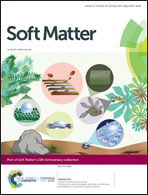In situ hydrogelation of forky peptides in prostate tissue for drug delivery†
Abstract
Herein, we have designed and synthesized a novel forky peptide D3F3 that transforms into a hydrogel through crosslinking induced by ZIs stimuli. We have employed D3F3 as a suitable drug carrier that is conjugated with DOX. Since the concentration of zinc ions necessary for triggering gelation falls into the physiological range present in prostate tissue, while other cationic ions fail to trigger at physiological concentrations, the peptide-based drug delivery system (DDS) is injectable and would achieve prostate tissue-specific self-assembly in situ. The D3F3 hydrogels exhibited an optimal gelation time, satisfactory mechanical strength (can be enhanced after incorporation of DOX) as well as excellent thixotropic properties. The DDS reserved some DOX in the prostate 24 h after the injection, making local sustained release possible. In addition, the peptide materials demonstrated no cytotoxicity against normal fibroblast cells and no damage was observed to the prostate tissue of rats. The drug release followed a non-Fickian diffusion model, with no burst release observed. Importantly, the DOX-hydrogel system exhibited good anti-cancer efficacy when incubated with prostate cancer cells DU-145. Therefore, this study lays the groundwork for the future design of tissue-specific DDSs that are triggered by cationic ions (e.g. zinc ions), and the platform could be further developed to incorporate other potent drugs utilized in the field of prostate cancer therapy, thereby increasing their potency and reducing their side effects.



 Please wait while we load your content...
Please wait while we load your content...